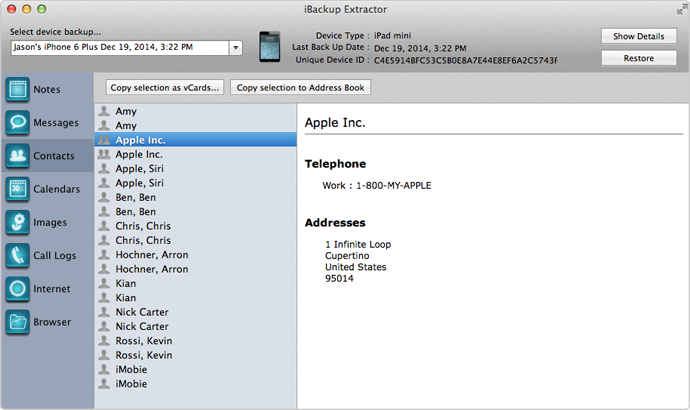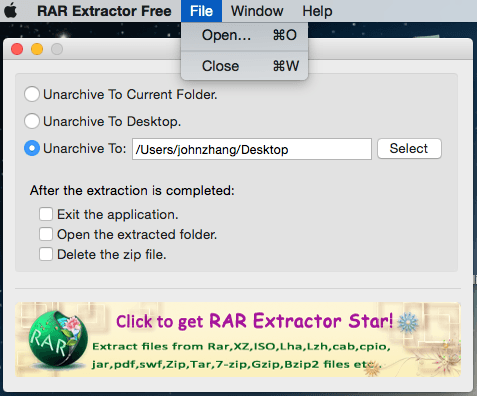Free Unzip For Mac

Optimized Storage in macOS Sierra and later* can save space by storing your content in iCloud and making it available on demand. When storage space is needed, files, photos, movies, email attachments, and other files that you seldom use are stored in iCloud automatically. Each file stays right where you last saved it, and downloads when you open it. Files that you’ve used recently remain on your Mac, along with optimized versions of your photos.
* If you haven't yet upgraded to macOS Sierra or later, learn about other ways to free up storage space.
How to run PeaZip free archiver utility and rar expander on Apple macOS / OSX systems. Open Source WinRar and WinZip alternative application for Mac, port.
Find out how much storage is available on your Mac
Choose Apple menu > About This Mac, then click Storage. This is an overview of available storage space on your Mac, as well as the space used by different categories of files:
Click the Manage button to open the Storage Management window, pictured below. (The Manage button is available only in macOS Sierra or later.)
Manage storage on your Mac
The Storage Management window offers recommendations for optimizing your storage. If some recommendations are already turned on, you will see fewer recommendations.
Store in iCloud
Click the Store in iCloud button, then choose from these options:
- Desktop and Documents. Store all files from these two locations in iCloud Drive. When storage space is needed, only the files you recently opened are kept on your Mac, so that you can easily work offline. Files stored only in iCloud show a download icon , which you can double-click to download the original file. Learn more about this feature.
- Photos. Store all original, full-resolution photos and videos in iCloud Photos. When storage space is needed, only space-saving (optimized) versions of photos are kept on your Mac. To download the original photo or video, just open it.
- Messages. Store all messages and attachments in iCloud. When storage space is needed, only the messages and attachments you recently opened are kept on your Mac. Learn more about Messages in iCloud.
Storing files in iCloud uses the storage space in your iCloud storage plan. If you reach or exceed your iCloud storage limit, you can either buy more iCloud storage or make more iCloud storage available. iCloud storage starts at 50GB for $0.99 (USD) a month, and you can purchase additional storage directly from your Apple device. Learn more about prices in your region.
Optimize Storage
Click the Optimize button, then choose from these options.
- Automatically remove watched movies and TV shows. When storage space is needed, movies or TV shows that you purchased from the iTunes Store and already watched are removed from your Mac. Click the download icon next to a movie or TV show to download it again.
- Download only recent attachments. Mail automatically downloads only the attachments that you recently received. You can manually download any attachments at any time by opening the email or attachment, or saving the attachment to your Mac.
- Don't automatically download attachments. Mail downloads an attachment only when you open the email or attachment, or save the attachment to your Mac.
Optimizing storage for movies, TV shows, and email attachments doesn't require iCloud storage space.
Empty Trash Automatically
Empty Trash Automatically permanently deletes files that have been in the Trash for more than 30 days.
Reduce Clutter
Reduce Clutter helps you to identify large files and files you might no longer need. Click the Review Files button, then choose any of the file categories in the sidebar, such as Applications, Documents, Music Creation, or Trash.
You can delete the files in some categories directly from this window. Other categories show the total storage space used by the files in each app. You can then open the app and decide whether to delete files from within it.
Learn how to redownload apps, music, movies, TV shows, and books.
Where to find the settings for each feature
The button for each recommendation in the Storage Management window affects one or more settings in other apps. You can also control those settings directly within each app.
- If you're using macOS Catalina, choose Apple menu > System Preferences, click Apple ID, then select iCloud in the sidebar: Store in iCloud turns on the Optimize Mac Storage setting on the right. Then click Options next to iCloud Drive: Store in iCloud turns on the Desktop & Documents Folders setting. To turn off iCloud Drive entirely, deselect iCloud Drive.
In macOS Mojave or earlier, choose Apple menu > System Preferences, click iCloud, then click Options next to iCloud Drive. Store in iCloud turns on the Desktop & Documents Folders and Optimize Mac Storage settings. - In Photos, choose Photos > Preferences, then click iCloud. Store in iCloud selects iCloud Photos and Optimize Mac Storage.
- In Messages, choose Messages > Preferences, then click iMessage. Store in iCloud selects Enable Messages in iCloud.
- If you're using macOS Catalina, open the Apple TV app, choose TV > Preferences from the menu bar, then click Files. Optimize Storage selects “Automatically delete watched movies and TV shows.”
In macOS Mojave or earlier, open iTunes, choose iTunes > Preferences from the menu bar, then click Advanced. Optimize Storage selects “Automatically delete watched movies and TV shows.” - In Mail, choose Mail > Preferences from the menu bar, then click Accounts. In the Account Information section on the right, Optimize Storage sets the Download Attachments menu to either Recent or None.
Empty Trash Automatically: From the Finder, choose Finder > Preferences, then click Advanced. Empty Trash Automatically selects “Remove items from the Trash after 30 days.”
Other ways that macOS helps automatically save space
With macOS Sierra or later, your Mac automatically takes these additional steps to save storage space:
- Detects duplicate downloads in Safari, keeping only the most recent version of the download
- Reminds you to delete used app installers
- Removes old fonts, languages, and dictionaries that aren't being used
- Clears caches, logs, and other unnecessary data when storage space is needed
How to free up storage space manually
Even without using the Optimized Storage features of Sierra or later, you can take other steps to make more storage space available:
- Music, movies, and other media can use a lot of storage space. Learn how to delete music, movies, and TV shows from your device.
- Delete other files that you no longer need by moving them to the Trash, then emptying the Trash. The Downloads folder is good place to look for files that you might no longer need.
- Move files to an external storage device.
- Compress files.
- Delete unneeded email: In the Mail app, choose Mailbox > Erase Junk Mail. If you no longer need the email in your Trash mailbox, choose Mailbox > Erase Deleted Items.
Learn more
- When you duplicate a file on an APFS-formatted volume, that file doesn't use additional storage space on the volume. Deleting a duplicate file frees up only the space required by any data you might have added to the duplicate. If you no longer need any copies of the file, you can recover all of the storage space by deleting both the duplicate and the original file.
- If you're using a pro app and Optimize Mac Storage, learn how to make sure that your projects are always on your Mac and able to access their files.
Supported archive formats
With The Unarchiver you can extract files from the following archive formats
| Zip | Full Zip Full support for the normal zip format, with additional support for AES encryption, Zip64 extensions for large files, Mac OS extensions of many different kinds, and several unusual compression methods. Can also extract .EXE self-extracting files using Zip. |
| Zipx | Full Zipx Full support for the new compression modes introduced by WinZip. |
| RAR | Full RAR Including encryption and multiple volumes. Can also extract .EXE self-extracting files using RAR. |
| 7z | Full 7z All common compression methods are supported. Also supports Unix extensions. |
| Tar | |
| Gzip | Full |
| Bzip2 | |
| LZMA, XZ | Full LZMA, XZ Both the old 'LZMA-alone' format, usually named .lzma, and the new .xz format. |
| CAB | |
| MSI | Full MSI This format is also used by many other Microsoft formats, meanings that you can use The Unarchiver to extract internal data from DOC and PPT files, and others. There is probably no reason to do this, but you can. |
| NSIS | Extensive NSIS Supports many different versions, starting from version 1.10 |
| EXE | Some EXE Many kinds of .exe self-extracting formats are supported. However, if you find one that is not, please post an issue on the bug tracker. |
| ISO, BIN, MDF, NRG, CDI | Extensive ISO, BIN, MDF, NRG, CDI Most common disc images can be unpacked, both normal and raw. |
| Split files | Basic Split files Can join files named .001, .002 that do not use any extra wrapper format. |
| StuffIt | No encryption StuffIt Can unpack all files I've been able to locate. |
| StuffIt X | Partial StuffIt X Can unpack many files, some more obscure features are still unsupported. JPEG compression is also unsupported. |
| DiskDoubler | Almost full DiskDoubler Only lacks some old compression methods, because I have not been able to locate any files using these. If you have some that do not work, please post them here. |
| Compact Pro | |
| PackIt | Full |
| Cpio | |
| Compress (.Z) | Full |
| ARJ | |
| ARC, PAK | Full ARC, PAK Full support for all algorithms, including proprietary ones from PAK. Encryption only works in command-line utilities. |
| Ace | Only old files |
| Zoo | Full |
| LZH | |
| ADF | FFS Bulk mailer download. ADF Can extract files from Amiga disk images using the regular FFS file system. |
| DMS | FFS DMS Can extract files from compressed Amiga disk images using the regular FFS file system. |
| LZX | |
| PowerPacker | Full |
| LBR | |
| Squeeze | Full |
| Crunch |

| XAR | FFS XAR Suggested replacement for Tar on Unix. Used in some newer .pkg files on macOS. |
| RPM | Full |
| Deb | Full |
| Ar | Full |
| ALZip | No encryption ALZip Archive format which is mainly popular in South Korea. Support for all known compression methods, including Bzip2, Deflate and obfuscated Deflate. |
| WARC | Full WARC Internet Archive Web Archive. Request and response headers also included in metadata. |
| NSA, SAR | Partial NSA, SAR Game data file. Can unpack all files I've found. If you have ones that do not unpack, please post an issue. |
| NDS | Full NDS Nintendo DS ROM image, which can contain a file system. Alternative to soda player for mac free. |
| SWF | Images and audio SWF Extracts images, sounds and music from Flash files. |
Bitmap images Extracts bitmap images from PDF files. Especially useful for scanned PDFs. |